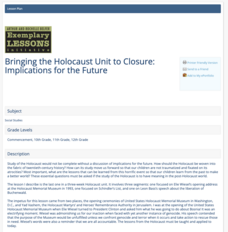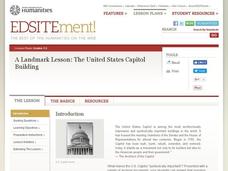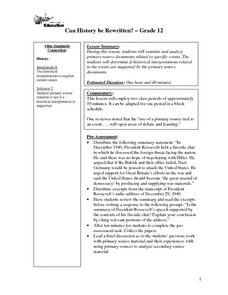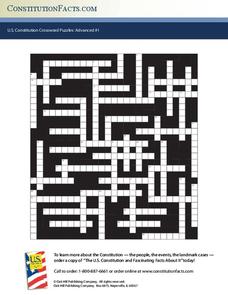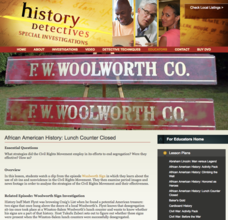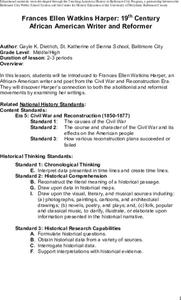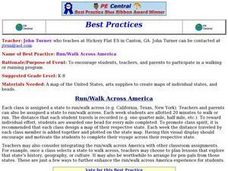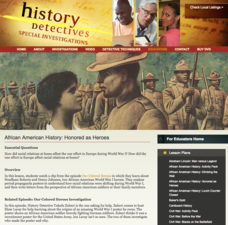Curated OER
Virtual State Tour
Students research one of the fifty states in depth and create a virtual tour that showcases their research. They create a quiz to accompany their tour and then present their tour and quiz to the class.
Curated OER
Bringing the Holocaust Unit to Closure: Implications for the Future
Students study the history of the Holocaust. it is complex; therefore, understanding its implications is complex as well. Elie Wiesel refers to the Holocaust as a question within a question. Questions lead to further questions, and still...
Curated OER
History of Political Parties in the U. S.
Twelfth graders name some of the parties in the political system of the United States. They identify the two main parties along with key information, issues, events, elections and/or people for each system. They then break into groups...
Curated OER
Four Famous Faces
Each one of our quarters is embellished with a famous face or image representing the state it came from. This lesson plan uses South Dakota's state quarter to get kids thinking about monetary value, what the president of the United...
Curated OER
Alexander Hamilton and the Roots of Federalism
Explore the origin of political parties in the United States. Learners work in groups to read and analyze copies of the "Report on Manufactures" written by Alexander Hamilton. Then, they complete a worksheet comparing the Federalists to...
Curated OER
What They Left Behind: Early Multi-National Influences in the United States
Students examine how the European voyages of discovery influence American culture even today. They map eighteenth century Europe's impact on the United States.
Curated OER
A Landmark Lesson: The United States Capitol Building
Students study the events in American history that affected the US Capitol Building. They name activities that happen in and around the Capitol by looking at primary source documents that are available online.
Curated OER
An Empire in the Balance
Eleventh graders investigate the role of New York state during the American Revolution. In small groups, they research a particular region within colonial America, analyze primary source documents, complete Document Analysis Sheets, and...
National Woman's History Museum
Susan B. Anthony: She's Worth a Mint!
A instructional activity all about Susan B. Anthony showcases the Civil Rights leader's contributions towards equality. A Susan B. Anthony coin sparks engagement. Scholars take part in a discussion that sheds light on what being an agent...
Curated OER
Can History Be Rewritten?
Can history be rewritten? Or, more precisely, is history documented accurately? High school juniors and seniors compare primary source material with secondary sources. For example, they compare President Roosevelt's December 29, 1940...
Theodore Roosevelt Association
Defining America's Role in the World
As the first American president to win the Nobel Peace Prize, and only one of four presidents to do so in United States history, Theodore Roosevelt's foreign policy achievements and preservation of peace are often overshadowed by his...
Constitution Facts
U.S. Constitution Crossword Puzzles: Advanced #1
What do Boston Harbor, the Electoral College, and Chief Powhatan have in common? They all represent vital moments in American history—and they are all clues in a thorough and challenging crossword puzzle about the United States...
University of Richmond
The Forced Migration of Enslaved People 1810-1860
Slavery not only involved the forced migration of African people from their homes, it also meant the forced removal of people within the United States. Using data and interactive graphics, scholars see how the tragedy of human slavery...
PBS
African American History: Lunch Counter Closed
Young historians investigate and evaluate the effectiveness of the strategies the Civil Rights Movement used to end segregation in the United States. After watching an video interview with Carl Matthews and Bill Stevens who participated...
Constitutional Rights Foundation
Women in the Military
Scholars analyze the role of women in the military in United States history. Using group research, debate, and diary entries, they explore various military activity in America. To complete the lesson, young historians write an essay...
Curated OER
The Great Military: Map of Texas
The battle at the Alamo may be one of the most famous military campaigns in Texas history, but it is by no means the only one. As part of their study of the military history of Texas, class members research less-well-known sites, locate...
PBS
The Roosevelts: An Intimate History—Snapshot Lessons
The Roosevelt family was one of the most influential and prominent political forces in the 20th century, leaving behind a wide-ranging legacy of conservation, progressivism, and economic growth. Learn more about President Theodore...
Center for History Education
Frances Ellen Watkins Harper: 19th Century African-American Writer and Reformer
Although some African American abolitionists—such as Sojourner Truth and Frederick Douglass—are well known, others, like Frances Ellen Watkins Harper, remain in the shadows of history. Harper was a poet and activist who played an...
Curated OER
Run/Walk Across America
Walk, jog, or run across America. Maps of individual states, visual progress, competition, and rewards, seem to be great motivational ideas. Make sure that the distances that each class has to walk or run are the same, because getting...
Smithsonian Institution
Who Am I?: A History Mystery
Who Am I? Scholars go online to gather clues and evidence to uncover just who was involved in the American Civil War. They use hands-on Internet activities to come to an understanding of the roles soldiers and civilians played in the...
PBS
Lesson Plan: “Seeing the Way: A Brief History of Cataract Surgery”
After looking at the history of cataract surgery techniques, your high schoolers will have a new perspective on medical and scientific advances. Kids alternate between watching short video clips, class discussion, and computer research....
NPR
This Isn't Right: A History of Women in Industry
Women were in the workplace long before Rosie the Riveter pushed up her sleeve. Learn about the working options available to women during the Industrial Revolution, the Progressive Era, and the Great Depression with a lesson that prompts...
PBS
African American History: Honored as Heroes
To gain an understanding of the treatment of African American soldiers during World War I, class members watch an excerpt from the History Detectives film, Our Colored Heroes, and then examine three recruitment posters from that time...
Stanford University
Japan and America
When Commodore Matthew Perry sailed to Japan and demonstrated American naval strength, he forced the empire to engage in trade with the United States. How did this new, strong-armed relationship influence both parties? Pupils consider...



